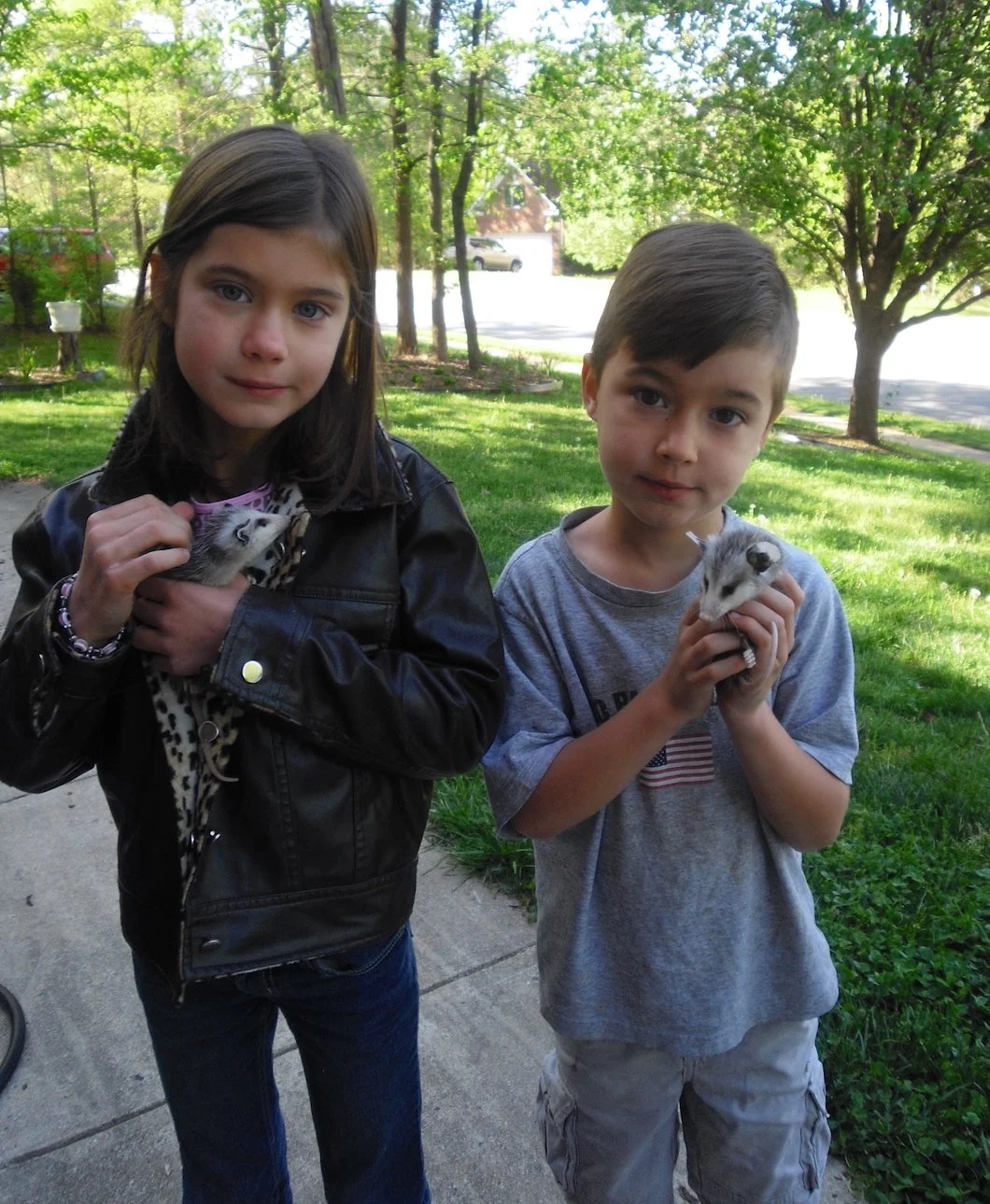Playing Possum a No Win
This article was published in the Viewpoints Section of The Durham News on 19 May 2010, and it’s just as applicable today as it was then. Though sadly The Triangle Wildlife Rehabilitation Center no longer exists, you can contact CLAWS (919- 619-0776) if you discover an opossum or other North Carolina wild animal needing assistance.
Three weeks ago, my son spotted a tiny opossum outside our house. The next day, he found the opossum in our garage. An Internet search suggested it was about 13 weeks old – too young for weaning. We put the little guy in a newspaper-lined box with fruit, cat-food and water. Over the next few days, our neighbors and we had rounded up 5 littermates.
As children, my friends and I ‘saved’ many animals and released them --squirrels, skunks, even a raccoon. So I was excited to do this with my kids. Plus, the Internet advised how to house, feed and release (at 22 weeks) infant opossums.
For the next 9 days, we cleaned the box and provided fresh food and water every night. Every possum was eating and pooping well.
A neighbor warned about rabies, but these guys were far from aggressive. Sure, one of them sometimes nipped at my husband and I, and once at my daughter. But he was just a tough guy, protecting his littermates.
On day 9, an opossum died. Assuming this was just natural selection, we buried him sadly in the back yard.
The next morning, my husband flew to the United Kingdom for work, and two more opossums died. I decided to get better care for those remaining.
We drove to the Triangle Wildlife Rehabilitation Center (544 3330, 1417 Seaton Road), where wonderful animal wall-art and knowledgeable, caring volunteers greeted us. After transferring the animals, the veterinarian pulled me aside for a serious discussion. We cannot rule out the very slight possibility that the opossums were infected with rabies, she informed.
Following our discussion, I brought the dead opossums to the TWRC for rabies testing and promised to call our physicians. I wasn’t too worried, as this was obviously precautionary. Back at home, I made an online donation to the TWRC and emailed my husband to call his doctor about tetanus and rabies shots. Then things took a 180-degree turn.
The opossum that nipped my husband had broken the skin, drawing a little blood. Now he was in a rabies-free country that might not have rabies vaccine and/or that might deport him at the mere mention of rabies. I started making phone-calls. Only three NC opossum rabies cases were recorded since 2005, and none were in the Triangle. Due to their low body temperature, opossums rarely contract rabies, and these babies showed no signs. Nonetheless, no one could guarantee that they were rabies-free. Our doctors knew little about rabies and don’t administer treatment. The state health department took the ‘better safe than sorry’ approach, with ‘safe’ defined as emergency room treatment (6 shots over 28 days) at a possible cost of $7000/person (or more).
Since only one unvaccinated person has survived rabies (Scientific American), once victims display symptoms (headache, fever, difficulty swallowing), they are all but dead. However, prior to showing symptoms rabies treatment is virtually 100% effective. Symptoms generally appear anywhere from 7 to 60 days, but may take many years.
While my husband and I wavered about what to do, the TWRC arranged for testing of the dead animals at NC State, having been unable to get Durham Animal Control to do so. The opossum that nipped us was alive, and we had been advised that if one had rabies, they all should have it. Still, did we want to take any chances?
I wondered whether this was another case of American over-reaction. Our society has become so protective that we’re taking adventure and discovery out of life altogether. Then again, rabies has spread drastically throughout America since raccoons were foolishly transported from Florida (where rabies has existed since the 1950’s) to West Virginia for hunting stock in 1976.
Fortunately, the dead opossums tested negative. Since his bite broke the skin, my husband may still get treatment when he is home.
We have learned our lesson. Things aren’t what they used to be. Rabies is a real threat throughout the country. Furthermore, the opossums had better survival chances if taken immediately to TWRC—-apparently they needed assistance with digestion and were starving. I hope others learn from our well- meaning mistakes and spare themselves (and the animals) our recent stress. If you find an animal that needs help, immediately call your nearest wildlife rehabilitation center and follow their instructions. If you want to help wildlife, consider volunteering at the center. And don’t forget to leave a financial donation, especially if you leave an animal. Like the animals, the center can’t live on good will alone.
The breeding season for the Virginia opossum can begin as early as December and continue through October with most infants born between the months of February and June.

